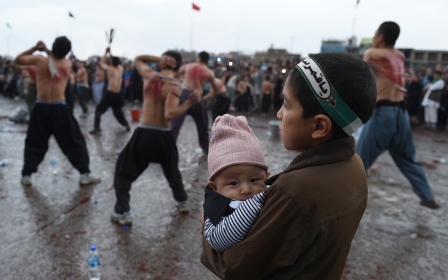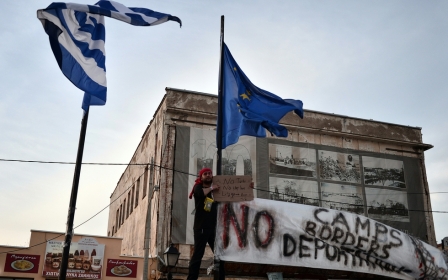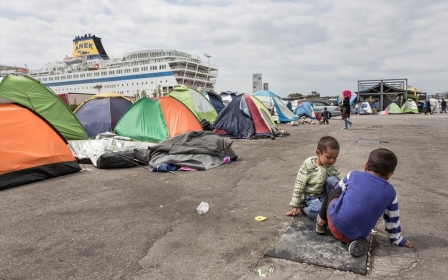Even in death, there's no place of rest for Syrians in Lebanon
In May, the father of a Syrian acquaintance of mine passed away in Beirut, where the family had fled from Aleppo shortly after the onset of war in Syria. On top of grieving and attending to his grieving mother, “Hassan” had to then sort out a location to bury his father.
It’s common knowledge that life in Lebanon is rough for Syrian refugees, who’ve had to contend with discrimination and violence, deadly winters, intermittent Syrian-specific curfews, and fluctuating and ambiguous rules - including the absurd requirement that poor refugees with no income pay money to obtain a notarised form promising that they won’t work. But death in Lebanon constitutes another headache altogether.
Inquiring at one of the main Beirut cemeteries near the Badaro area, Hassan was told by the security guard on duty that a “donation” of at least $10,000 was necessary to facilitate approval for a burial plot. If he was looking for a cheaper option, the guard said, lesser donations were accepted at the “Palestinian cemetery” next door - apparently referred to as such based on the fact that it hosts the remains of numerous Palestinian fighters from the civil war era.
A quick tour of that cemetery, however, left Hassan with the sneaking suspicion that the relative discount may have in part been a result of underhanded practices by the undertakers, such as digging up and reselling unvisited plots.
In the end, procuring a gravesite was much less of an ordeal for Hassan and his family - who happen to be among the wealthier echelons of those fleeing Syria - than it is for the majority of Syrians in Lebanon.
The phenomenon of the $10,000 minimum donation is unique to the Lebanese capital, where the lucrative nature of the burial industry has to do with the fact that there simply isn’t much space unoccupied by concrete. Beirut families who sorted their burial spaces long ago of course aren’t subjected to these fees.
But even in more remote areas of the country where the profitability of death is not so high, burial costs are often still beyond the realm of possibility for Syrian refugees. A plot with a price-tag of $300, for example, is the equivalent of grocery money for almost two years for many refugees living in makeshift tents constructed from plastic tarps and advertising banners.
As Amnesty International noted last year, “the most vulnerable Syrian refugees in Lebanon receive just $13.50 per month or less than half a dollar a day for food assistance”.
In October 2015, I visited two tented settlements for refugees in Lebanon’s Bekaa Valley, close to the Syrian border. There, residents spoke of the hardship of not being able to die at home.
One man, for example, had recently had to find a burial plot for his father, who had perished on the side of the road while en route to buy potatoes. He described a rather humiliating scene in which he was forced to make rounds of local sheikhs and beg for a bit of earth in which to lay the body to rest. One sheikh eventually consented.
Many refugees, unable to locate and/or afford official gravesites for loved ones, have taken to burying them in secret under cover of night.
A recent Agence France-Presse dispatch titled “For Syrians in Lebanon, no resting place in life or death” meanwhile recounts the earthly trials of a young Syrian refugee couple who lost three infants in a row in Lebanon and had to seek burial plots for tiny bodies that were three months, five days, and two hours old, respectively.
The second diminutive corpse ended up being inserted into the grave of the first one, while the third was buried in a separate district.
The AFP report notes that, according to Lebanese authorities and international organisations, “death rates among Syrian refugees are much higher than among the local population” - a logical state of affairs, no doubt, given refugees’ disproportionate exposure to the elements and disease. This is not to imply, obviously, that life is a piece of cake for the “local population” as a whole, which in certain areas happens to suffer from extraordinarily high rates of poverty thanks to less-than-benign policies pursued by the ruling elite.
The AFP quotes a sympathetic local sheikh in the Bekaa Valley who “says he and colleagues from the Bekaa tried to find land for a cemetery specifically for Syrians, but no one would sell… ‘If a metre square was $10, it became $50 as soon as they learned it would become a burial ground,’ he said.”
Of course, Lebanon is far from the only place on this earth to put a hefty price on a dignified burial; in many Western countries, the dignity accorded to corpses enjoys a direct relationship with the depth of the corpse’s former pockets, or the pockets of surviving family members.
The socioeconomic divide that has been punitively institutionalised in life has, you might say, also survived the crossing to the other side.
But in any event, we can safely conclude that the landscape confronting Syrian refugees in Lebanon is one that has been fairly thoroughly purged of humanity - whether said refugees are alive or dead.
- Belen Fernandez is the author of The Imperial Messenger: Thomas Friedman at Work, published by Verso. She is a contributing editor at Jacobin magazine.
The views expressed in this article belong to the author and do not necessarily reflect the editorial policy of Middle East Eye.
Photo: A part of Beirut cemetery is seen on June, 2016 (MEE/Marwan El Solh).
Middle East Eye propose une couverture et une analyse indépendantes et incomparables du Moyen-Orient, de l’Afrique du Nord et d’autres régions du monde. Pour en savoir plus sur la reprise de ce contenu et les frais qui s’appliquent, veuillez remplir ce formulaire [en anglais]. Pour en savoir plus sur MEE, cliquez ici [en anglais].





